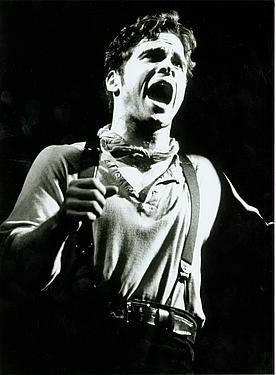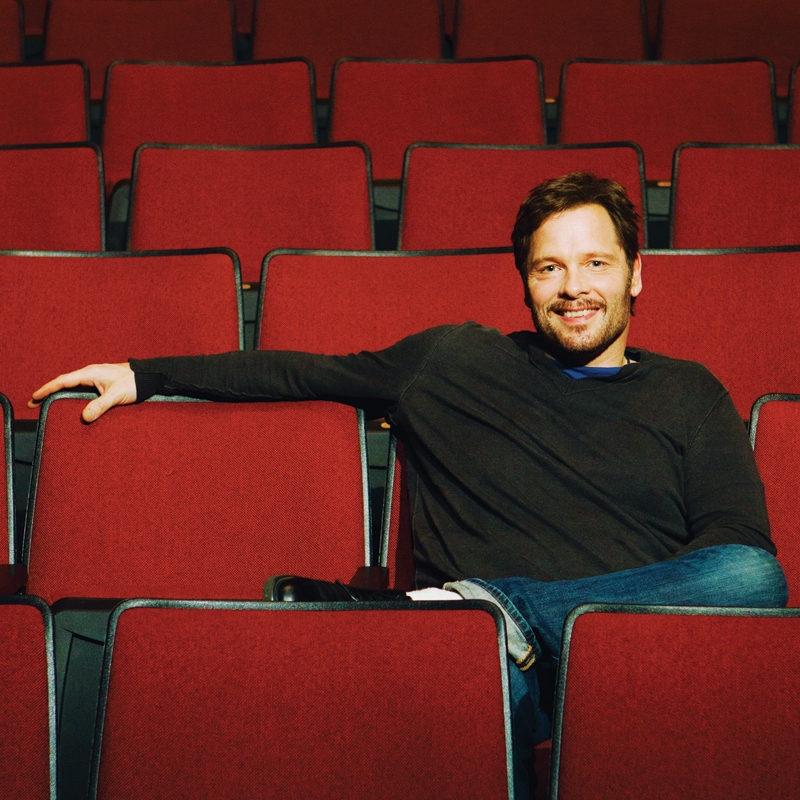Becky Keeshin spoke with Award winning, Musical Theatre actor, Michael Hayden to ask him about his thoughts on the profession and teaching ASC’s first Musical Theatre class, Acting The Song.
How did you discover theater and music? How old were you? How was your journey to becoming a working actor?

I discovered it as many of us do. Doing plays in elementary school and then getting serious about it in high school. My public high school had an amazing acting program. I had a professor who was trained in Stanislavski and we spent three years reading the books and doing exercises. We did eight shows a year, two major productions and six student directed productions. I was also playing football, which was my first passion, but got injured and could no longer play. I went to college for business, but couldn’t do that! I became a Theatre Major at a small university in Minnesota and then went into the real world. I then got accepted to Julliard and that’s where I feel I got my real training.
What excites you about storytelling through song?
I suppose by the nature of Musical Theatre, I am excited by the heightened experience, passion, vulnerability, and the danger. The scope, I don’t mean how big, I mean that it’s like Shakespeare. When prose isn’t enough, when speaking isn’t enough, trying to express something you can’t find the words to say, one must turn to song. Our everyday language is no longer sufficed to express something through words. A song can be quiet and also full throttle; it tasks the performer in a way that straight acting doesn’t. People who can act and sing have special skills. It’s not easy to do what we do.
What do you think makes a good Musical Theatre song, both in the writing and the performance of the song?
It’s the convergence of the words, music, and the voice in such a way that helps the material press the question of the piece; it’s fantastically entertaining and shockingly human. Working on pieces that task people’s humanity, that is what interests me. A great song asks an enormous question and the song is the journey through that question. By the end of the song, the question has been answered. Or at the very least, you are in a new place that couldn’t have happened without the music. Sondheim and Schwartz, for example, do it in a way that is completely their own. A great writer/librettist marries the words and the notes.  A great performer finds out why here and why now? It’s about making choices, it isn’t by chance. There’s a reason these words and music were written. It’s the same with Shakespeare and Molière. My job is to bring the piece to life. If you aren’t performing in a courageous way, it could end up insipid and boring. We want someone on stage that is willing to crash and burn! It’s all about making choices.
A great performer finds out why here and why now? It’s about making choices, it isn’t by chance. There’s a reason these words and music were written. It’s the same with Shakespeare and Molière. My job is to bring the piece to life. If you aren’t performing in a courageous way, it could end up insipid and boring. We want someone on stage that is willing to crash and burn! It’s all about making choices.
What do you hope students will gain from taking Acting the Song?
Working with an accompanist. It sounds simple, it’s not. There’s nothing simple about what we do. I hope my students learn to collaborate, and to analyze a song. Discover the author’s voice, the meaning in the rhythm, behind the union of the language and music. I hope they make choices. There’s always an implicit question, something to be answered. “What am I doing? What do I want?” By the end of your song, the world is changed. I want to aid them in not being self conscious. What we do is impossible. You can’t get up in front of people and not be scared. I want my students to practice when you experiment working on a song for the tenth time, and it becomes something you never knew it was. I want them to learn that a song can be dangerous, uncertain, sexy and alive as any piece of great theater. Great singers are a dime a dozen, beautiful shocking performances are not. And I want them to have fun. It’s all about play, structured play. Techniques can only be intuitive when we play. 
What advice do you have for young people who are just starting their careers, specifically in relation to Musical Theatre?
The qualities of voices in this country are so great. What happens though, in my experience, is that it is a very rare actor that approaches a song like a piece of text in a play. The acting is given a short trip or as if it’s separate thing from the music. Musical Theatre artists have more required of them, they have to have vocal stamina. What is my advice? Make sure that your technique is sound. Actors are losing their voices left and right. Make sure you aren’t chewing your voice up and get proper training. Learn how to work, to bring a song in a musical to life. For example, think of Hamlet. How many Hamlets have we seen? Someone does “To be or not to be”, but when they make it completely their own, there is nothing greater. We see performances like that and say “How can I do that?!” If you want to be successful, you better learn how to do something only you can do. How you bring songs and characters to life in a musical? You have power over that.



